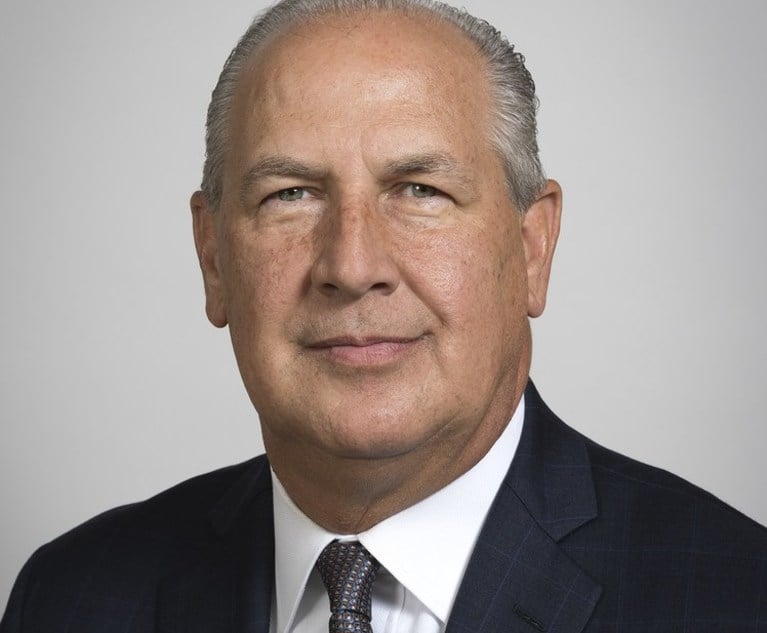Under Market Pressures, Pa. Partners Play Musical Chairs
Cozen O'Connor's Michael Heller said his firm avoids actively recruiting from fellow Philadelphia firms. But etiquette has its limits.
May 11, 2018 at 04:47 PM
6 minute read

Pennsylvania-based firms have been increasingly looking to grow their revenue through head count and geographic expansion. Sometimes, that means taking from a neighbor.
The lateral markets in Philadelphia and Pittsburgh have been steadily active over the past 18 months, as law firm growth becomes an increasingly zero-sum game. And while in the past firms may have been hesitant to recruit lawyers from fellow Pennsylvania-based firms, that is no longer the case.
“Way back, before lateral recruiting and lateral movement was involved … there was definitely more of a hands-off sense to that,” Philadelphia-area recruiter Frank D'Amore, of Attorney Career Catalysts said. “As the law firm world became more like the business world, things changed.”
Jeffrey Lowe, global practice leader at Major, Lindsey & Africa, agreed that cutthroat lateral hiring is a fact of competition at every level in the industry. And while it's hardly a new phenomenon in Philadelphia or anywhere else, “I think it's accelerating” he said.
“There used to be, for lack of a better word, a gentlemen's agreement among law firms not to poach from one another in their home market,” Lowe said. “Those have really started to fall to the wayside in all cities.”
Accelerating Movement
Philadelphia-based Cozen O'Connor has been one of the more aggressive firms in Pennsylvania when it comes to lateral hiring, even though, CEO Michael Heller said, growth in Philadelphia has not been central to the firm's strategic plan. Still, Heller made a nod to the “gentlemen's agreement” to which Lowe referred.
“I also do not believe it appropriate to actively recruit groups of lawyers from other firms in Philadelphia,” Heller said. “My friends are running the other firms in Philadelphia, and I want them to do well.”
Still, friendship only goes so far. In just over a year, Cozen O'Connor has hired groups from several locally based firms, including a construction group from Pepper Hamilton, 30 lawyers from Buchanan Ingersoll & Rooney, and most recently 14 commercial litigators from Drinker Biddle & Reath.
Those groups came to Cozen O'Connor either through a recruiter, or by reaching out to the firm themselves, Heller said, not as a result of Cozen O'Connor's own outreach. Once those lawyers have expressed a desire to leave their firm, “I've got a fiduciary duty to my firm to at least consider the opportunity,” he said.
“With respect to the caliber of groups they've been able to attract locally, it's been very impressive,” D'Amore said of the Cozen O'Connor hires.
Other native Philadelphia firms are fighting their own wars of attrition.
Earlier this year, Blank Rome took three litigators from Pepper Hamilton. Pepper Hamilton last year hired the leader of Saul Ewing Arnstein & Lehr's business and finance and life sciences practices, Deborah Spranger. And after Cozen O'Connor's raid on Pittsburgh-based Buchanan Ingersoll, the latter firm, whose CEO is based in Philadelphia, took eight lawyers from Obermayer Rebmann Maxwell & Hippel to rebuild its labor and employment practice in the city.
Mark Morris, managing partner of Philadelphia-based Fox Rothschild, noted that his firm has made few lateral hires from fellow Pennsylvania-based firms, but that doesn't mean he's against it.
“I don't think we would actively solicit people, but I think if people come to us and are going to move anyway, we would be interested,” Morris said.
Philadelphia recruiter Liz Shapiro said she's noticed a pickup in lateral hiring activity level and interest among firms in Pennsylvania, as well as in other markets.
“The only time I really saw hesitation [about hiring from another local firm] was where there was a professional relationship” between the firms, she said. “If the components are right, personal is personal and business is business.”
Law firms are being more opportunistic about adding groups or individuals with a book of business, Shapiro said, and that's increasing competition among them for lateral hires. Lateral movement “doesn't seem to be as seasonal as it once was,” she said.
“The quest to get revenue continues and is to some extent harder and harder,” D'Amore said.
Another factor, Shapiro noted, is that more conflicts are arising more frequently as law firms grow. That might cause some lawyers to start looking.
The recent group move from Drinker Biddle to Cozen O'Connor, which took place with the help of a recruiter, stands as an example.
“We started looking a while ago because we had some continuing conflict of interest issues that were getting increasingly difficult to solve,” partner Michael Miller told The Legal last month. “Most of the conflicts issues resolved on their own, but by then we had met Michael Heller.”
The Downside
Still, these moves can have their complications. When Cozen O'Connor brought on the construction group from Pepper Hamilton last year, it resulted in litigation—brought not by Pepper Hamilton, but a former client of partners who moved. The ex-client alleged that Cozen O'Connor mishandled conflicts after the group lateral move, but a judge ultimately ruled in Cozen O'Connor's favor, denying the client's motion for injunction.
And it's not just in-state hires that cause friction. Even in other markets, things can become tense when a law firm recruits partners from another firm with the same homestate.
Swartz Campbell and Chartwell Law Offices, for example, became embroiled in long-running litigation over partner poaching not in the Philadelphia region, where both are headquartered, but in Florida, after a group of lawyers left Swartz Campbell for Chartwell beginning in 2010. The case finally settled in February, the same day a trial was set to begin.
To lessen the blow after a lateral move, sometimes firms will highlight their use of a recruiter when announcing a group hire in order “to send a signal to another firm that we aren't raiding your firm,“ D'Amore said.
On the other hand, some firms may see no advantage in such niceties, or may see a reason to flaunt their lateral appetites in order to convert clients from their hires' former firm, D'Amore said. Cozen O'Connor, for instance, was not shy about the numbers when it took its 30th lawyer from Buchanan Ingersoll, putting the tally right into its announcement.
“If it's someone who has a lot of business … the odds that the business will follow usually increase if you have a number of lawyers going with them that would support the amount of work they have,” he said.
And after all, without the clients, what's all that lateral hiring for?
This content has been archived. It is available through our partners, LexisNexis® and Bloomberg Law.
To view this content, please continue to their sites.
Not a Lexis Subscriber?
Subscribe Now
Not a Bloomberg Law Subscriber?
Subscribe Now
NOT FOR REPRINT
© 2025 ALM Global, LLC, All Rights Reserved. Request academic re-use from www.copyright.com. All other uses, submit a request to [email protected]. For more information visit Asset & Logo Licensing.
You Might Like
View All
Kirkland Lands in Phila., but Rate Pressure May Limit the High-Flying Firm's Growth Prospects
5 minute read
Montgomery McCracken Touts 'Record' Financial Performance Despite Shrinking Head Count
6 minute read
Class Action Settlements Totaled $40B+ Three Years in a Row: 'We’re in a New Era'
5 minute readTrending Stories
- 1The Benefits of E-Filing for Affordable, Effortless and Equal Access to Justice
- 2AI and Social Media Fakes: Are You Protecting Your Brand?
- 3A Primer on Using Third-Party Depositions To Prove Your Case at Trial
- 4‘Catholic Charities v. Wisconsin Labor and Industry Review Commission’: Another Consequence of 'Hobby Lobby'?
- 5With DEI Rollbacks, Employment Lawyers See Potential For Targeting Corporate Commitment to Equality
Who Got The Work
J. Brugh Lower of Gibbons has entered an appearance for industrial equipment supplier Devco Corporation in a pending trademark infringement lawsuit. The suit, accusing the defendant of selling knock-off Graco products, was filed Dec. 18 in New Jersey District Court by Rivkin Radler on behalf of Graco Inc. and Graco Minnesota. The case, assigned to U.S. District Judge Zahid N. Quraishi, is 3:24-cv-11294, Graco Inc. et al v. Devco Corporation.
Who Got The Work
Rebecca Maller-Stein and Kent A. Yalowitz of Arnold & Porter Kaye Scholer have entered their appearances for Hanaco Venture Capital and its executives, Lior Prosor and David Frankel, in a pending securities lawsuit. The action, filed on Dec. 24 in New York Southern District Court by Zell, Aron & Co. on behalf of Goldeneye Advisors, accuses the defendants of negligently and fraudulently managing the plaintiff's $1 million investment. The case, assigned to U.S. District Judge Vernon S. Broderick, is 1:24-cv-09918, Goldeneye Advisors, LLC v. Hanaco Venture Capital, Ltd. et al.
Who Got The Work
Attorneys from A&O Shearman has stepped in as defense counsel for Toronto-Dominion Bank and other defendants in a pending securities class action. The suit, filed Dec. 11 in New York Southern District Court by Bleichmar Fonti & Auld, accuses the defendants of concealing the bank's 'pervasive' deficiencies in regards to its compliance with the Bank Secrecy Act and the quality of its anti-money laundering controls. The case, assigned to U.S. District Judge Arun Subramanian, is 1:24-cv-09445, Gonzalez v. The Toronto-Dominion Bank et al.
Who Got The Work
Crown Castle International, a Pennsylvania company providing shared communications infrastructure, has turned to Luke D. Wolf of Gordon Rees Scully Mansukhani to fend off a pending breach-of-contract lawsuit. The court action, filed Nov. 25 in Michigan Eastern District Court by Hooper Hathaway PC on behalf of The Town Residences LLC, accuses Crown Castle of failing to transfer approximately $30,000 in utility payments from T-Mobile in breach of a roof-top lease and assignment agreement. The case, assigned to U.S. District Judge Susan K. Declercq, is 2:24-cv-13131, The Town Residences LLC v. T-Mobile US, Inc. et al.
Who Got The Work
Wilfred P. Coronato and Daniel M. Schwartz of McCarter & English have stepped in as defense counsel to Electrolux Home Products Inc. in a pending product liability lawsuit. The court action, filed Nov. 26 in New York Eastern District Court by Poulos Lopiccolo PC and Nagel Rice LLP on behalf of David Stern, alleges that the defendant's refrigerators’ drawers and shelving repeatedly break and fall apart within months after purchase. The case, assigned to U.S. District Judge Joan M. Azrack, is 2:24-cv-08204, Stern v. Electrolux Home Products, Inc.






